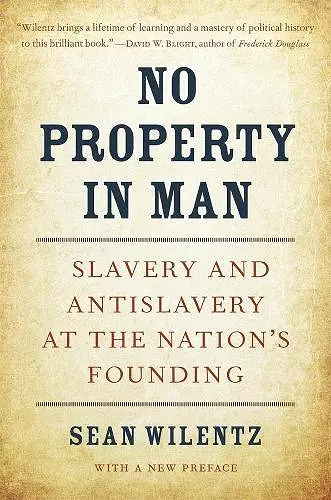No Property in Man
Slavery and Antislavery at the Nation’s Founding, With a New Preface
Format:Paperback
Publisher:Harvard University Press
Published:27th Sep '19
Should be back in stock very soon

“Wilentz brings a lifetime of learning and a mastery of political history to this brilliant book.”
—David W. Blight, author of Frederick Douglass
A New York Times Book Review Editors’ Choice
A Foreign Affairs Best Book of the Year
Americans revere the Constitution even as they argue fiercely over its original toleration of slavery. In this essential reconsideration of the creation and legacy of our nation’s founding document, Sean Wilentz reveals the tortured compromises that led the Founders to abide slavery without legitimizing it, a deliberate ambiguity that fractured the nation seventy years later. Contesting the Southern proslavery version of the Constitution, Abraham Lincoln and Frederick Douglass pointed to the framers’ refusal to validate what they called “property in man.” No Property in Man has opened a fresh debate about the political and legal struggles over slavery that began during the Revolution and concluded with the Civil War. It drives straight to the heart of the single most contentious issue in all of American history.
“Revealing and passionately argued…[Wilentz] insists that because the framers did not sanction slavery as a matter of principle, the antislavery legacy of the Constitution has been…‘misconstrued’ for over 200 years.”
—Khalil Gibran Muhammad, New York Times
“Wilentz’s careful and insightful analysis helps us understand how Americans who hated slavery, such as Abraham Lincoln and Frederick Douglass, could come to see the Constitution as an ally in their struggle.”
—Eric Foner
What does Wilentz know that others have gotten so terribly wrong about the founding connection between slavery and racism? In his revealing and passionately argued book, he insists that because the framers did not sanction slavery as a matter of principle, the antislavery legacy of the Constitution has been ‘slighted’ and ‘misconstrued’ for over 200 years. -- Khalil Gibran Muhammad * New York Times *
Examines the debate over the legal status of enslaved people that began with the writing of the Constitution and continued up to the Civil War—a period in American history in which he finds an important lesson for how to achieve political change in a democracy…No American historian of his generation has written so well on so many different subjects; few even come close. * The Nation *
Demonstrating that the Constitution both protected slavery and left open the possibility of an antislavery politics, Wilentz’s careful and insightful analysis helps us understand how Americans who hated slavery, such as Abraham Lincoln and Frederick Douglass, could come to see the Constitution as an ally in their struggle. -- Eric Foner, author of the Pulitzer Prize–winning The Fiery Trial: Abraham Lincoln and American Slavery
Stimulating…draws on letters, speeches and public debates to enlarge our sense of slavery’s political dimension in the founding period. -- David S. Reynolds * Wall Street Journal *
Wilentz shows what we dearly need to see now as much as ever: that slavery and antislavery were joined at the hip in the American founding, as well as in the tragic history that led to the Civil War. The Constitution possessed fatal complicity with racial slavery but also sowed seeds of its destruction. Wilentz brings a lifetime of learning and a mastery of political history to this brilliant book. -- David W. Blight, author of Frederick Douglass: Prophet of Freedom
Sean Wilentz offers readers a forceful argument, an attentiveness to competing perspectives, an appreciation for nuance and irony, a thorough mastery of pertinent sources, and elegant writing. This is a book that both specialists and generalists will profit from reading. -- Randall Kennedy, author of For Discrimination: Race, Affirmative Action, and the Law
Like Sherlock Holmes noticing the dog that didn’t bark, Sean Wilentz discerns the revealing absence of a property right in slaves that hardline southerners failed to secure at the Constitutional Convention of 1787. Clearly and without apology, Wilentz explains the framers’ familiar compromises with slavery. But until now no historian has examined the critical concession antislavery delegates refused to make. There would be no constitutional right of property in man. -- James Oakes, author of The Scorpion’s Sting: Antislavery and the Coming of the Civil War
Was the U.S. Constitution, as the South Carolinian states-man John C. Calhoun believed, a pro-slavery document, or did it, as President Abraham Lincoln argued, deny slavery a place in national law and point toward abolition? Although most Americans outside the academy would assume that Calhoun was wrong and Lincoln right, the contrary view has gained so much ground among academics in recent years that Wilentz’s qualified endorsement of Lincoln’s interpretation is both bracing and brave. Wilentz’s thoroughly researched argument serves as a useful example of solid scholarship and effective writing on a sensitive topic. -- Walter Russell Mead * Foreign Affairs *
Will reshape American thinking on a deep American matter…Goes to the heart of the present-day consternation over the national identity and its history. -- Paul Berman * The Tablet *
Undeniably enlightening. * Kirkus Reviews *
An insightful account of slavery’s place in United States politics from the nation’s founding to the start of the Civil War. One of the leading political historians of our time, Wilentz draws on his extensive knowledge of the period to give readers fresh insights into historians’ long-running debate over slavery’s place in American politics. -- Frank Towers * Labour *
ISBN: 9780674241428
Dimensions: unknown
Weight: unknown
368 pages
2nd edition